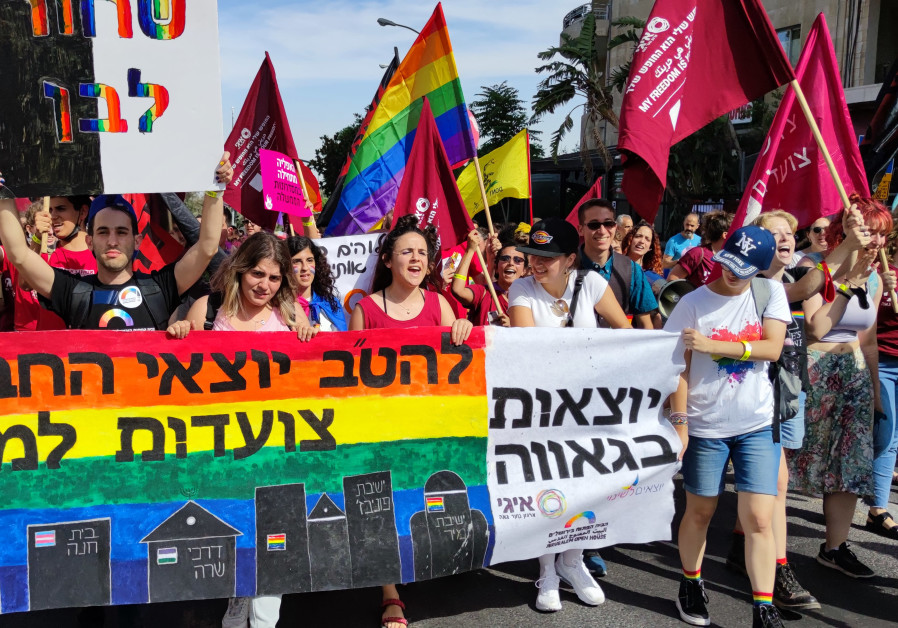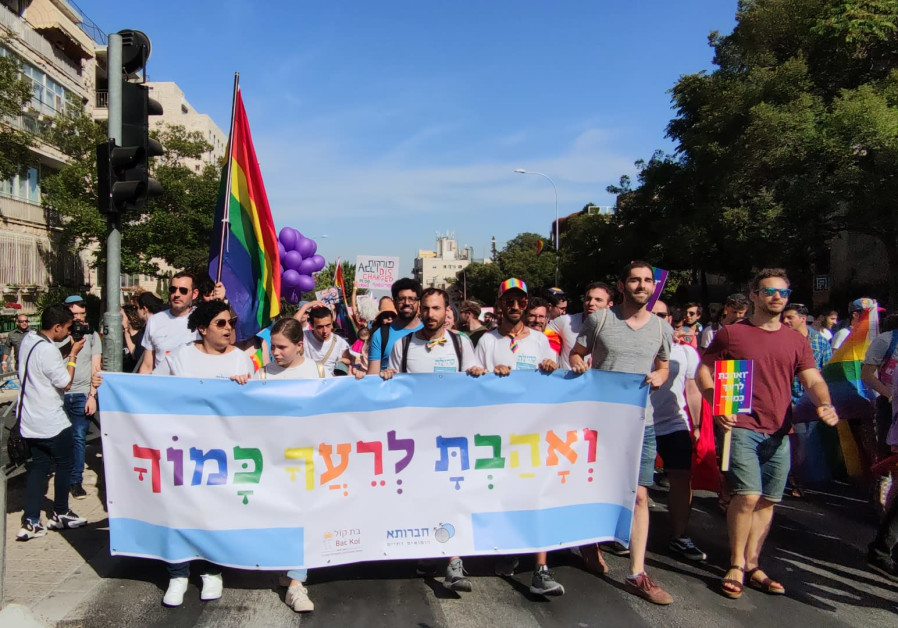The Jerusalem March for Pride and Tolerance set out from Liberty Bell Park on its traditional route on Thursday afternoon for the first time since the coronavirus pandemic began.Some 7,500 people were estimated to have taken part in the march organized annually by the Jerusalem Open House.Participants marched while protesting and celebrating a return to the large-scale Pride events after two years without.One of the defining features of Jerusalem’s gay pride parade is the religious LGBTQ+ community, which marches while blasting Jewish religious music and dancing like at any Jewish event. Many participants could be seen wearing kippot, tzitzit and hair coverings traditionally worn by religious women while celebrating all parts of their identity in unison.“There’s no better timing than the establishment of a new coalition, and the negotiations between all the political parties, to celebrate our pride in Jerusalem,” said Shay Bramson, chairman of religious LGBTQ+ support and advocacy group Havruta. “The religious LGBTQ+ community in Israel wants our representatives to remember us in their future political steps, such as a law banning conversion therapies.”
In 2015, a haredi (ultra-Orthodox) man protesting against the Jerusalem Pride march stabbed 16-year-old Shira Banki to death and wounded six others. Since then, security at the event has been tightened.Police arrested two minors Wednesday night for hanging up provocative signs condemning Jerusalem’s Pride parade. The two suspects fled when they saw the officers, and, after pursuing them, police found dozens of signs in their possession.Additionally on Wednesday, a man was arrested for allegedly threatening to kill members of the LGBTQ+ community at the march.This year’s event passed without any reported incidents.A number of officials were present at the march, including officials from the US Embassy in Jerusalem, European Union Ambassador Emanuele Giaufret and Blue and White MK Eitan Ginzburg.Thousands of police officers were stationed along the route of the march and in the area, in order to secure the event. A number of roads throughout the area were closed during the event.Additionally the Police also secured sites where participants of the march plan to celebrate later in the day.Unlike most years, there was no rally at the end of the march. Instead, everyone went home or to viewing parties and watched a special Pride event broadcast on Facebook Live and the Open House’s YouTube channel.The broadcast included musical performances by artists from Jerusalem and throughout Israel and panels discussing burning topics within the LGBT community.“After a very complex year for all of us, a year in which the necessity of a space like the Jerusalem Open House has once again been proven, we are happy to march the streets of our city again with a perfect combination of protest and celebration,” said Noam Yavin, chairman of the Jerusalem Open House. “The counter-demonstrations and derogatory cries from extremists will not move us from the goal we are striving for which is to raise a flag of change for Jerusalem and present the LGBTQ+ community in the city. I am happy and thank everyone who joined us today in our important struggle in the capital.”“Our struggle for equality is not over yet and it is not surprising that Jerusalem was ranked in a very low position in the latest Pride Index,” said Alon Shahar, director-general of the Jerusalem Open House. “As a community we must continue to fight for our visibility and presence in the city and deal with the budgetary discrimination we receive from the municipality. We will continue to work for the community and take our place in the Jerusalem arena because we are here to stay.”בנצי גופשטיין במחאה של להב"ה מול מצעד הגאווה: "השמאלנים ויתרו עליכם ומכרו את זכויותיכם בשביל לשבת עם עבאס. שנה הבאה מועצת השורא תחליט שאין מצעד גאווה"@carmeldangor pic.twitter.com/BaQaffCBQK
— כאן חדשות (@kann_news) June 3, 2021
 The Jerusalem Open House has started a campaign to raise funds in recent weeks, with costs rising amid a threefold increase in applications and an increase in activity. The coronavirus pandemic also harmed the organization economically. The campaign ends on Thursday night at midnight.The march started off pride month in Israel and will be followed by events throughout the summer in cities across Israel. The Tel Aviv Pride Parade, the largest Pride event in Israel is expected to take place at the end of June.“The Jerusalem March for Pride and Tolerance, which opens Pride Month in which more than 50 pride events will be held throughout the country, symbolizes a united and egalitarian Israel, an Israel that has a place for everyone and everyone,” said, the director-general of the Aguda – The Association for LGBTQ+ Equality in Israel. “We will never give up on full recognition and full rights and will continue to fight in every government for our lives. It is a protest of all of us for our right to live in security and equality everywhere, for each and every one of us and it will continue until [there is] fully equal rights.”Last year, because of the cancellation of the march, Jerusalem and Tel Aviv held simultaneous rallies to mark Pride month.
The Jerusalem Open House has started a campaign to raise funds in recent weeks, with costs rising amid a threefold increase in applications and an increase in activity. The coronavirus pandemic also harmed the organization economically. The campaign ends on Thursday night at midnight.The march started off pride month in Israel and will be followed by events throughout the summer in cities across Israel. The Tel Aviv Pride Parade, the largest Pride event in Israel is expected to take place at the end of June.“The Jerusalem March for Pride and Tolerance, which opens Pride Month in which more than 50 pride events will be held throughout the country, symbolizes a united and egalitarian Israel, an Israel that has a place for everyone and everyone,” said, the director-general of the Aguda – The Association for LGBTQ+ Equality in Israel. “We will never give up on full recognition and full rights and will continue to fight in every government for our lives. It is a protest of all of us for our right to live in security and equality everywhere, for each and every one of us and it will continue until [there is] fully equal rights.”Last year, because of the cancellation of the march, Jerusalem and Tel Aviv held simultaneous rallies to mark Pride month.